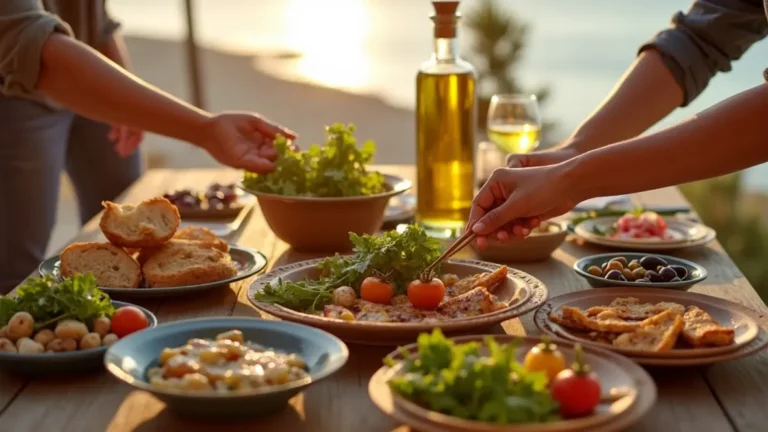Eating well can help your body stay resilient — but no single food is a magic shield. This short guide highlights five evidence-backed foods to boost immunity, explains how they work, and gives practical ways to add them to everyday meals. You’ll also get realistic context from health organizations and a registered dietitian so you can make safe, sustainable changes rather than chasing quick fixes.
Top 5 foods to boost immunity — what to eat and why

Eating well helps your body stay resilient, but no single food is a magic shield. Below are five everyday foods that most reliably support immune health, what nutrients they provide, how they work, realistic portion ideas, and brief evidence notes so you can make safe, sustainable choices.
1) Citrus fruits — lemons, oranges, grapefruits
- Key nutrients: Vitamin C, small amounts of folate, fiber.
- How they help: Vitamin C supports production and function of white blood cells and acts as an antioxidant that helps protect cells from damage. Regular intake helps maintain levels that support immune responses during daily life and mild illness.
- Portion suggestion: 1 medium orange or grapefruit, or 1/2 cup of freshly squeezed juice (limit added sugar). Add citrus segments to salads or have a citrus-based dressing with meals to boost intake.
- Evidence: Harvard T.H. Chan School of Public Health highlights vitamin C-rich foods as part of a healthy diet that supports immune function; the NHS also recommends a varied diet including vitamin C sources to meet daily needs and maintain general health.
2) Fermented foods & plain yogurt
- Key nutrients: Probiotics (live cultures), protein, calcium, B vitamins.
- How they help: A balanced gut microbiome communicates with the immune system; probiotics can help maintain gut barrier function and modulate immune responses. Fermented foods provide live cultures that may support this interaction.
- Portion suggestion: 3/4–1 cup plain yogurt (look for ‘live and active cultures’), a small bowl of kefir, or a couple of tablespoons of sauerkraut or natural kimchi with meals.
- Evidence: Public health resources and nutrition experts note that fermented foods and probiotics contribute to gut health, which is linked to immunity, though research is evolving and effects vary by product; a registered dietitian emphasizes choosing minimally sweetened yogurts and varied sources of fermented foods for best benefits.
3) Nuts & seeds — almonds, walnuts, pumpkin seeds
- Key nutrients: Zinc (pumpkin seeds), vitamin E, healthy fats, selenium (Brazil nuts in very small amounts), protein.
- How they help: Zinc is essential for immune cell development and antiviral responses; vitamin E and healthy fats help maintain cell membranes and act as antioxidants. Small, regular servings support micronutrient status without excess calories.
- Portion suggestion: A small handful (about 1 ounce / 28 g) daily: 6–8 brazil nuts (for selenium rotate intake), a tablespoon of pumpkin seeds, or a small mix of almonds and walnuts.
- Evidence: The NHS and nutrition authorities note zinc as important for immune function and recommend meeting needs through diet where possible; registered dietitians advise including mixed nuts and seeds as a nutrient-dense regular snack.
4) Garlic and immune-supporting mushrooms (e.g., shiitake, maitake)
- Key nutrients/compounds: Sulfur compounds (allicin) in garlic, beta-glucans and other immune-modulating polysaccharides in many mushrooms, vitamin D precursors in some varieties.
- How they help: Garlic’s bioactive compounds have antimicrobial properties and may support immune responses; mushrooms contain beta-glucans that can modulate immune activity. Cooking garlic gently preserves benefits; mushrooms add fiber and unique bioactives.
- Portion suggestion: 1–2 cloves of garlic daily incorporated into cooking; 1 cup cooked mushrooms 2–3 times per week as part of meals.
- Evidence: Harvard and other nutrition resources discuss garlic and mushrooms as healthful foods with compounds that can support immune-related pathways, though they are complementary pieces of a broader diet rather than standalone cures; a registered dietitian recommends including them regularly for flavor and nutrient variety.
5) Berries — blueberries, strawberries, raspberries
- Key nutrients: Antioxidants (flavonoids, anthocyanins), vitamin C, fiber.
- How they help: Antioxidants reduce oxidative stress and support cell signaling in the immune system; fiber also feeds gut microbes that, in turn, influence immune health. Berries offer potent antioxidant activity in small portions.
- Portion suggestion: 1/2–1 cup fresh or frozen berries daily—add to yogurt, oatmeal, or smoothies without extra sugar.
- Evidence: Harvard nutrition resources highlight fruits high in antioxidants as part of a disease-preventing dietary pattern; public health guidance recommends regular fruit intake to support overall health and resilience.
Practical pairing tip: pair vitamin C-rich foods (citrus, berries) with iron-containing plant foods (beans, spinach) to enhance iron absorption, and include a little healthy fat (olive oil, avocado, nuts) when eating fat-soluble nutrients to aid absorption. Aim for variety across these five food groups rather than focusing on a single “immune food.” If you suspect a deficiency or have frequent infections, consult your GP or a registered dietitian for testing and personalised advice.
Easy daily recipes and meal swaps to add immune-boosting foods

Eating well can be simple and practical — small swaps and quick recipes make it easy to add more vitamin C, probiotics, zinc and antioxidants to everyday meals. Below are ready-to-use ideas for breakfasts, lunches, snacks and dinners, plus pairing tips to get the most from each bite, a one-week sample menu, and shopping/prep shortcuts for busy schedules.
Breakfast ideas
-
Yogurt parfait (serves 1): layer 3/4 cup plain yogurt (look for live cultures), 1/2 cup mixed berries (fresh or frozen, thawed), 2 tbsp mixed nuts and seeds, and a drizzle of honey. The probiotic yogurt supports gut immune function while berries add antioxidants.
-
Citrus oatmeal bowl (serves 1): cook 1/2 cup oats in water or milk, stir in zest and juice of 1/2 orange, 1 tbsp chia or flaxseed, and 1 tbsp almond butter. The orange gives vitamin C and the almond butter provides healthy fat to help absorb fat-soluble nutrients from other foods later in the day.
-
Quick citrus smoothie (serves 1): blend 1 small banana, 1/2 cup plain yogurt, 1/2 cup orange segments, a handful of spinach, and 1 tsp grated ginger. Spinach contains non-heme iron; the citrus helps iron absorption.
Lunch swaps and quick recipes
-
Spinach-and-bean salad with citrus dressing (serves 2): toss 4 cups baby spinach, 1 cup cooked chickpeas, 1/2 cup sliced cucumber, 1/4 red onion. Whisk 2 tbsp olive oil, juice of 1 orange, 1 tbsp apple-cider vinegar, salt and pepper. The vitamin C in the orange improves iron uptake from the chickpeas; olive oil adds fat for fat-soluble nutrient absorption.
-
Sandwich upgrade: swap mayo for a yogurt-garlic spread (1/2 cup plain yogurt mixed with 1 clove minced garlic, lemon zest, and pepper) to add probiotics and immune-supporting garlic flavor without much extra fat.
-
Leftover-friendly bowl: combine roasted garlic vegetables, a handful of greens, a scoop of yogurt, and a sprinkle of toasted seeds for zinc and healthy fats.
Snack ideas
-
Trail mix for immunity (makes 6 servings): mix 1 cup almonds, 1/2 cup pumpkin seeds (great source of zinc), 1/2 cup dried cranberries, and 1/4 cup dark chocolate chips. Portion into snack bags for grab-and-go energy.
-
Berry kefir smoothie: blend 1 cup kefir (probiotic), 1/2 cup mixed berries, and 1 tbsp flaxseed for antioxidants and omega-3s.
-
Simple citrus and nut plate: sliced orange or grapefruit with a small handful of walnuts — quick, portable, and nutrient-dense.
Dinner recipes and swaps
-
Garlic-roasted vegetable tray (4 servings): chop 4 cups mixed vegetables (carrots, bell peppers, broccoli, mushrooms), toss with 2 tbsp olive oil, 3 crushed garlic cloves, salt, and pepper. Roast at 425°F / 220°C for 20–25 minutes. Serve with brown rice and a protein of choice; garlic and mushrooms add immune-supporting compounds and savory depth.
-
Lemon-garlic salmon (2 servings): season two 4-oz fillets with salt, pepper, 1 tsp olive oil, minced garlic, and lemon slices; bake at 400°F / 10–12 minutes. Serve with a spinach salad dressed in olive oil and extra citrus for a vitamin C boost to aid iron absorption from the greens.
-
Stir-fry with mushrooms and greens: sauté sliced mushrooms in sesame oil, add garlic, ginger, shredded cabbage, and baby bok choy; finish with a squeeze of lime and a sprinkle of toasted pumpkin seeds for zinc.
Food pairing tips to maximize nutrient absorption
-
Pair vitamin C with plant iron: add citrus, strawberries, or bell peppers when eating iron-rich plant foods (lentils, beans, spinach) to increase non-heme iron absorption.
-
Include a source of healthy fat with meals: nuts, seeds, olive oil, avocado or oily fish help your body absorb fat-soluble nutrients (vitamins A, D, E, K) and some antioxidant compounds.
-
Combine probiotics and prebiotic foods: pair fermented foods or yogurts with fiber-rich fruits, vegetables or oats to support a healthy gut environment.
Evidence and realistic expectations
- The NHS advises a varied, balanced diet to support overall health and the immune system rather than relying on single ‘superfoods.’
- Harvard T.H. Chan School of Public Health highlights vitamin C, zinc and probiotics as nutrients that help immune function but stresses they work as part of an overall pattern of healthy eating.
- A registered dietitian notes: ‘Small, consistent swaps — like adding citrus to beans or a spoonful of yogurt to a smoothie — are more sustainable and effective than chasing quick fixes.’
One-week sample menu (practical, quick)
- Monday: Breakfast – yogurt parfait; Lunch – spinach-and-bean salad with citrus dressing; Snack – trail mix; Dinner – garlic-roasted vegetables with quinoa.
- Tuesday: Breakfast – citrus oatmeal bowl; Lunch – leftover roasted veg bowl with seeds; Snack – orange and almonds; Dinner – lemon-garlic salmon and steamed greens.
- Wednesday: Breakfast – kefir berry smoothie; Lunch – whole-grain sandwich with yogurt-garlic spread and pickled cucumbers; Snack – apple with almond butter; Dinner – mushroom stir-fry with brown rice.
- Thursday: Breakfast – yogurt parfait; Lunch – salad with chickpeas and citrus vinaigrette; Snack – roasted pumpkin seeds; Dinner – baked chicken, roasted carrots and kale.
- Friday: Breakfast – citrus smoothie; Lunch – grain bowl with roasted veg and tahini; Snack – mixed berries; Dinner – quick pasta with garlic, mushrooms and spinach.
- Saturday: Breakfast – oatmeal with nuts and orange zest; Lunch – tuna salad with mixed greens and lemon; Snack – dark chocolate and walnuts; Dinner – vegetable tray roast with hummus and whole-grain flatbread.
- Sunday: Breakfast – scrambled eggs with spinach and a side of grapefruit; Lunch – leftover stir-fry; Snack – kefir and berries; Dinner – baked fish, roasted broccoli, and a citrusy slaw.
Shopping and prep shortcuts for busy people
- Buy frozen berries, precut vegetables and pre-washed greens to save time without sacrificing nutrients.
- Roast a large tray of mixed vegetables once or twice a week; use them in salads, bowls, and wraps.
- Portion nuts and trail mix into individual bags so snacks are ready to grab.
- Make a simple citrus dressing in a jar (juice, oil, mustard, salt) and keep it in the fridge for up to a week.
- Keep plain yogurt or kefir on hand for quick parfaits, dressings, or to swap for heavier condiments.
- Use canned beans for effortless protein and iron; rinse them to reduce sodium.
Practical notes on portions and safety
- Aim for a variety across the week rather than large daily doses of any single food; typical portions above are designed for most adults but adjust to personal energy needs.
- Excessive zinc from long-term, high-dose supplements can be harmful; food sources like pumpkin seeds and nuts are usually safer ways to add zinc. Consult a GP or registered dietitian if you suspect a deficiency or are considering high-dose supplements.
For more ideas on small, sustainable swaps that boost nutrient intake and support whole-body goals, explore small changes to daily eating.
Simple, repeatable recipes and a few thoughtful swaps make it easy to include foods to boost immunity in everyday life — combined with sleep, movement and stress management, they support resilience without drama.
Lifestyle context: when food helps — and when to see a pro

Good food sets the stage for a responsive immune system, but it’s only one of several everyday habits that keep you well. Sleep, stress levels, movement and hydration each influence immune function in meaningful ways — think of diet as the foundation that’s strengthened by healthy routines, not a standalone shield.
Sleep: restorative sleep supports immune memory and inflammatory control. Short nights increase infection risk and blunt vaccine responses, so prioritise regular sleep patterns alongside nutrient-rich meals. A citrus fruit or a berry-rich yogurt bowl as a light evening snack can supply vitamin C and antioxidants without upsetting sleep.
Stress and mental load: chronic stress raises cortisol and promotes inflammation, which can undermine defence mechanisms. Nutrition helps (for example, omega-3s and antioxidant-rich foods can lower inflammation), but stress-management practices — breathwork, brief walks, or a consistent bedtime routine — are equally important.
Exercise and movement: regular moderate activity enhances immune surveillance; extreme or prolonged exertion temporarily suppresses it. Combining movement with good nutrition, such as snacks that include protein and vitamin C after workouts, supports recovery.
Hydration: adequate fluids keep mucous membranes moist, helping to trap and clear pathogens; water also aids digestion and nutrient transport. Simple habits — a glass beside your breakfast of citrus and yoghurt — matter more than fancy drinks.
When supplements may be appropriate
Supplements can help in specific circumstances: documented nutrient deficiencies, restrictive diets, older age, pregnancy (with specific prenatal formulations), or certain medical conditions that impair absorption. But supplements are not a substitute for a balanced diet and healthy lifestyle.
Short authoritative perspectives
“Good nutrition, adequate sleep and regular physical activity are foundational to immune health.” — World Health Organization (paraphrased guidance)
“There is limited evidence that vitamin supplements prevent infections in otherwise healthy people; getting nutrients from food is usually preferable.” — NHS (paraphrased guidance)
“Food is the foundation — supplements can fill gaps, but testing and tailored advice avoid unnecessary risk.” — Registered dietitian Sarah Patel, RD
Zinc and other supplement safety notes
- Zinc can help short-term immune responses, but it has a narrow safety window. For most adults, the recommended upper intake is about 40 mg per day from all sources; prolonged intakes above this can cause nausea, interfere with copper absorption and lead to deficiency of other minerals.
- Avoid intranasal zinc products: they have been linked to loss of smell (anosmia) and are not recommended.
- Zinc supplements can interact with some antibiotics (such as tetracyclines and fluoroquinolones) and reduce absorption if taken simultaneously; separate dosing by a few hours.
- Probiotics are generally safe for healthy people but should be used cautiously in severely immunocompromised individuals or those with central lines or severe pancreatitis.
- High doses of individual antioxidant supplements have not been shown to prevent infections and, in some cases, can be harmful; food-based antioxidants from berries, citrus fruits and vegetables remain the preferred source.
Signs that suggest a professional assessment is warranted
Consider seeing your GP or a registered dietitian if you have:
- Recurrent or unusual infections (frequent colds, prolonged illness) or persistent fatigue despite reasonable sleep and good diet.
- Unexplained weight loss, long-term digestive symptoms (diarrhoea, malabsorption), or conditions like inflammatory bowel disease that affect absorption.
- Symptoms suggesting specific deficiencies: delayed wound healing, frequent mouth ulcers, hair thinning, or diminished taste/smell can suggest zinc or other nutrient issues; easy bruising and bleeding gums can indicate low vitamin C.
- Chronic health conditions (diabetes, autoimmune disease) or medications that affect nutrition status.
- Plans to start high-dose supplements (for example, high-dose zinc or megadoses of vitamins) — these should be discussed with a clinician and, where appropriate, blood tests performed first.
How a GP or registered dietitian can help
A GP can order targeted blood tests (iron, vitamin D, B12, zinc markers where indicated) and screen for medical causes of frequent infections or fatigue. A registered dietitian provides personalised meal plans, assesses dietary patterns and helps reconcile supplements with medications, ensuring safe, evidence-based steps toward better immune resilience.
Practical takeaway
Use food-first strategies — a varied diet rich in vitamin C (citrus fruits), probiotics (yogurt and fermented foods), zinc (nuts, seeds, mushrooms), and antioxidant-packed berries — and pair them with good sleep, stress care, regular moderate exercise and adequate hydration. Reserve supplements for identified needs or as advised by a professional, and seek medical support if symptoms persist, worsen or are accompanied by concerning signs.
Conclusion
Food is a powerful, everyday tool to support immune resilience, but its effects are measured and part of a bigger picture. Prioritize a varied diet rich in vitamin C, probiotics, zinc and antioxidants, and combine these with sleep, movement and stress care. If you suspect a deficiency or have persistent fatigue or frequent infections, see your GP or a registered dietitian for testing and personalised advice.
Want more easy nutrition tips and meal ideas to stay well year-round? Explore more nutrition tips at RelexaHub.



